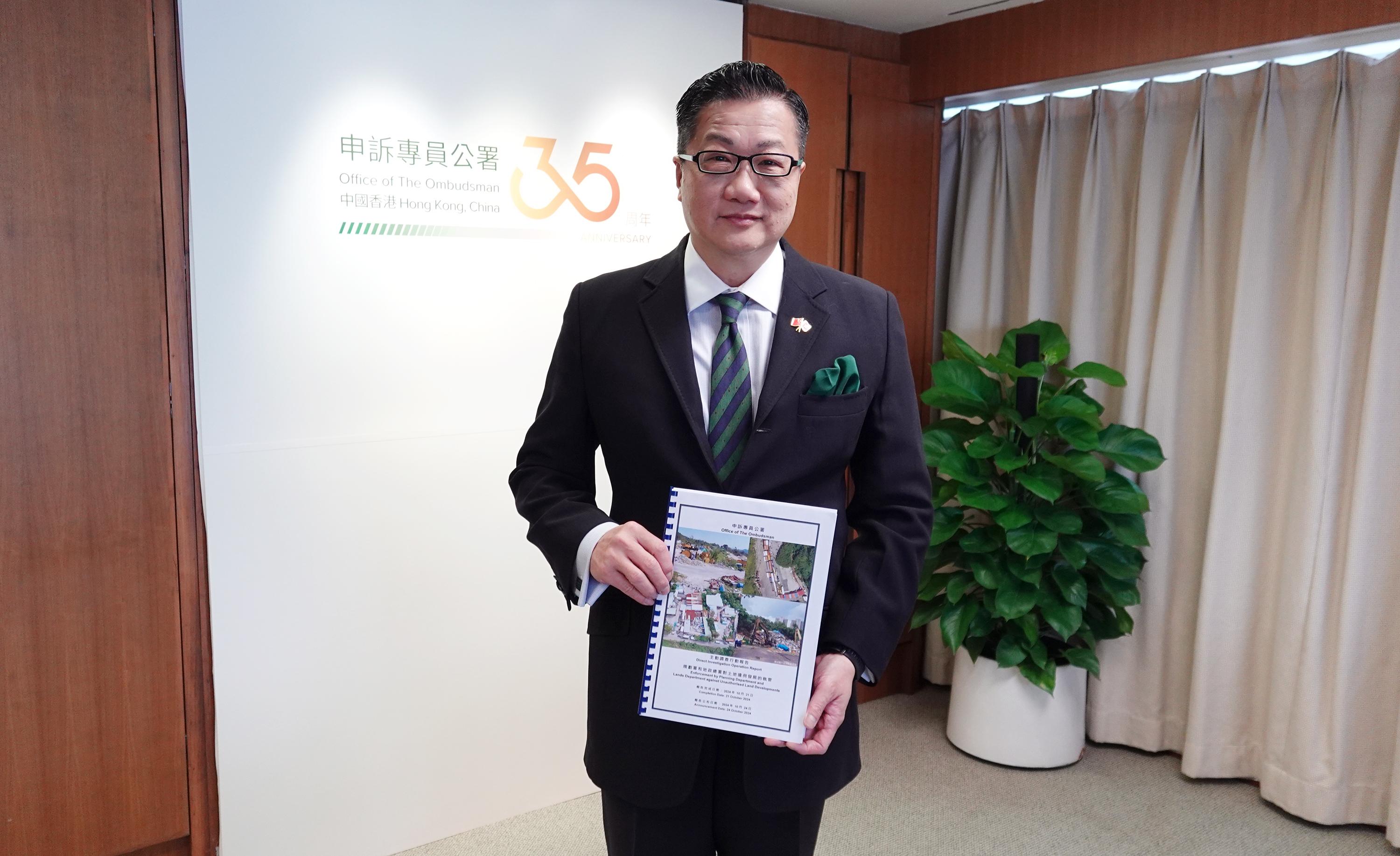The following is issued on behalf of the Office of The Ombudsman:
The Ombudsman, Mr Jack Chan, today (October 24) announced the completion of a direct investigation operation regarding the enforcement by the Planning Department (PlanD) and the Lands Department (LandsD) against unauthorised land developments, and made 16 major recommendations for improvement to the two departments.
In the rural New Territories, common unauthorised developments under the Town Planning Ordinance (TPO) include filling of pond or land in "Agriculture", "Green Belt" and conservation zones for storage, workshop and parking uses. For many years, the PlanD had not been empowered to take enforcement action in rural areas not previously covered by development permission areas. The Office is pleased to note that with the amended TPO coming into effect in September 2023, the Secretary for Development may designate rural areas in the New Territories with ecological value, which are subject to development pressure and risks of environmental degradation, to be "regulated areas", so as to plug the loophole by enabling the PlanD's enforcement action against unauthorised developments in such areas.
From 2018 to 2023, the PlanD received an annual average of 1 680 complaints about unauthorised developments. During the same period, combining complaints, proactive inspections and referrals from other departments, the PlanD identified an annual average of 425 unauthorised development cases involving private land.
Regarding the unauthorised development cases identified, the PlanD issued an annual average of more than 3 000 statutory notices demanding rectification. The compliance rate of such notices ranged from 69 per cent to 88 per cent between 2018 and 2023, reflecting the deterrent effect of the PlanD's existing enforcement measures against most offenders. During the same period, the PlanD instigated prosecutions in a total of 475 cases of non-compliance with statutory notices, among which 65 involved repeated prosecutions.
The Office of The Ombudsman's investigation found that for cases involving repeated breaches of the TPO, the PlanD would, depending on whether the unauthorised development recurred within one year, shorten the timeframe for compliance with the Enforcement Notice from the normal three months to a minimum of one month. Given that cases of repeated breaches generally involve irregularities that are easy to rectify and prone to recur (such as storage and parking uses), the existing practice of the PlanD might not have a sufficient deterrent effect on some repeated offenders. The Office recommends that, regarding cases of repeated breaches, the PlanD should explore considering more factors in setting the timeframe for compliance with statutory notices and progressively shortening the timeframe upon subsequent breaches to raise offenders' costs of non-compliance proportionately.
As for cases that breach the TPO while concurrently involving unlawful occupation of government land, it is often difficult to confirm the identity of the occupier or responsible person. Hence, such cases are currently handled by the LandsD under the Land (Miscellaneous Provisions) Ordinance by demolishing and taking possession of the property and structures on the land. The LandsD prioritises different types of cases under a risk-based approach. Nevertheless, the Office's investigation revealed that for cases involving both priority and non-priority circumstances, the LandsD's existing guidelines for staff were unclear about how each case should be classified as a whole. There were also cases revealing the LandsD's failure to complete priority cases in a timely manner. The Office considers that the LandsD should comprehensively review its existing guidelines, put in place a monitoring mechanism and step up training to ensure proper follow-up of cases by its staff.
Mr Chan said, "The Government is duty-bound to combat unauthorised land developments rigorously to safeguard the environment and optimise the use of valuable land resources. Overall, the Office considers that both the PlanD and the LandsD have handled unauthorised development cases according to their purview and statutory powers; however, there is still room for improvement regarding enforcement procedures and intensity. Moreover, the Office noticed that during the initial stage of this direct investigation operation, there was indeed room for enhancement in the efficiency of collaboration between the PlanD and the LandsD. The Office is pleased to note that both departments responded positively to its observations and opinions by proactively establishing a joint working group co-led by their deputy directors, and introducing a pilot scheme involving two large-scale unauthorised developments related to private agricultural land selected for joint enforcement operations. In addition to reviewing the above new initiatives in a timely manner, to further deepen collaboration, the Office recommends that the PlanD and the LandsD establish a database for unauthorised development cases to facilitate interdepartmental intelligence sharing and enforcement, as well as formulate targeted measures for high-risk sites to nip problems in the bud.
"Looking ahead, as the current-term Government actively implements various land development projects, land use in the rural New Territories will undergo vast changes. Unauthorised developments may differ in mode, scale, etc. The PlanD and the LandsD, as enforcement authorities, should conduct a systemic review after the implementation of the various improvement measures. The two departments should also adapt to the circumstances, continuously deepen reform and innovate, and improve the operational mechanisms and collaboration to strengthen their ability to prevent and handle unauthorised developments."
The Office has made the following major improvement recommendations to the PlanD and the LandsD:
- regarding cases involving repeated breaches of the TPO, the PlanD to explore considering more factors (including the total number of breaches committed by the offender, the gross area of the site, the nature of irregularities and the impact on environmental hygiene) in setting the timeframe for compliance with statutory notices and progressively shortening such timeframe upon subsequent breaches to raise offenders' costs of non-compliance proportionately;
- the PlanD to draw up guidelines on the procedures and target timeframe for handling unauthorised development cases involving a change in ownership for periodic circulation to staff to avoid omission of necessary action;
- the PlanD to step up efforts to explain the basics of the Reinstatement Notice through such publicity channels as its official website to promote public awareness of its enforcement measures and avoid misunderstanding;
- the PlanD to step up education and publicity to enhance private land owners' understanding of their obligations, the damage caused by unauthorised developments to the environment, the enforcement role of the department, the price to be paid by offenders and the essential features of the TPO to raise law-bidding awareness;
- the LandsD to comprehensively review its existing guidelines and specify clearly the various factors for determining whether a case falls within the priority category, supplemented with real cases to illustrate how to assess cases involving both priority and non-priority circumstances, for compliance by staff;
- the LandsD to put in place a monitoring mechanism to ensure proper prioritisation of different cases by staff;
- the LandsD to step up training to ensure that staff clearly understand the enforcement role of the department and take timely action against non-compliance with the law and lease conditions according to its performance indicators;
- the PlanD and the LandsD to consider drawing up a mechanism and timetable for timely review of the joint working group's guiding direction, thereby ensuring that the new measures can serve the purpose of enhancing interdepartmental collaboration;
- the PlanD and the LandsD to conduct timely review of the effectiveness of the pilot scheme on joint enforcement operations;
- the PlanD and the LandsD to respectively review the data they maintained on interdepartmental unauthorised development cases and enforcement action, and discuss any need to incorporate more data items, thereby providing a more precise and comprehensive basis for monitoring and analysing enforcement work;
- the PlanD and the LandsD to consider establishing a database on unauthorised development cases with such information as the identity of offenders, subject locations, irregularities and results of follow-up action, thereby facilitating interdepartmental intelligence sharing and enforcement;
- the PlanD and the LandsD, making use of the above newly established database, to formulate targeted measures for high-risk sites having regard to such factors as the severity of breaches and whether repeated breaches are involved to nip problems in the bud;
- in light of the amended TPO, the PlanD and the LandsD to review the enforcement and case referral procedures in a timely manner and explore room for further streamlining and consolidation to optimise the use of resources for coping with an anticipated increase in enforcement work; and
- the PlanD and the LandsD to conduct a systemic review after the implementation of the various improvement measures. The two departments should also adapt to the circumstances, continuously deepen reform and innovate, and improve operational mechanisms and collaboration to strengthen their ability to prevent and handle unauthorised developments.
Upon Mr Chan's assumption of office, one of the strategic focuses of the Office is to make every effort to promote interdepartmental collaboration. Effective interdepartmental collaboration is indispensable to efficient and people-oriented public administration as well as good governance. A lack of co-ordination among different departments or organisations is prone to shirking responsibilities, thereby directly affecting the well-being of the public. When handling relevant cases, the Office will request all departments and organisations concerned to take follow-up action and fully collaborate with other agencies, with a view to effectively resolving the difficulties facing the public. Where unclear divisions of responsibilities involve systemic issues, the Office will firmly point out the crux of the matter and urge the departments and organisations to seriously rationalise responsibilities or, if necessary, establish high-level platforms for resolving disputes, in order to address the problem at its root.
Furthermore, as different departments and organisations have their respective professional knowledge, expertise and experience, fostering their collaboration can create a synergy effect, thereby enhancing the quality and standard of public administration. Therefore, through handling cases and organising seminars and experience-sharing sessions from time to time, the Office tirelessly encourages various departments and organisations to deepen collaboration in their daily work on all fronts, including setting up communication and collaboration platforms, optimising case referral procedures, formulating information exchange mechanisms, sharing professional skills and technology, and launching joint operations.
The above direct investigation operation is a successful example of the Office's efforts to promote interdepartmental collaboration. In addition, in the first half of this reporting year (i.e. from April to September 2024), the Office has handled 94 cases involving interdepartmental collaboration. The Office has also progressively launched on its website and social media platforms real cases of interdepartmental collaboration to enhance public understanding of how the Office addresses their needs through promoting interdepartmental collaboration.
Mr Chan said, "In the coming years, the overriding objective of the Office is to help resolve the difficulties facing the public in order to improve people's livelihood and foster social harmony. I encourage all government departments and public organisations to work together on the premise of 'Improving people's livelihood', and jointly enhance administrative arrangements for better public services and a stronger sense of gain and happiness among members of our community."
The full investigation report has been uploaded to the website of the Office of The Ombudsman at www.ombudsman.hk for public information.
Follow this news feed: East Asia







